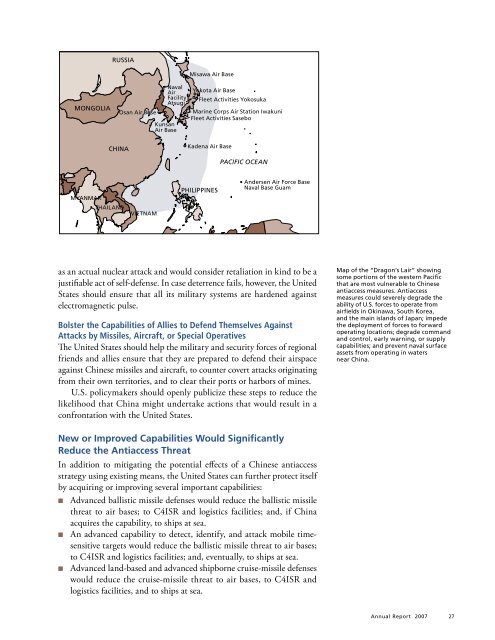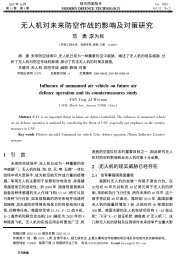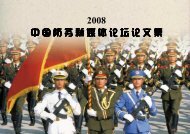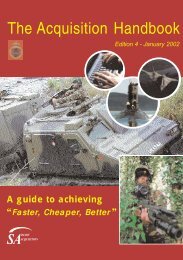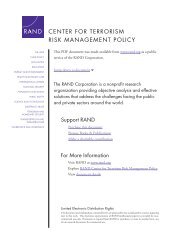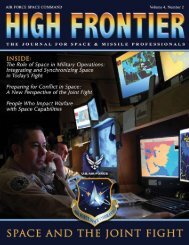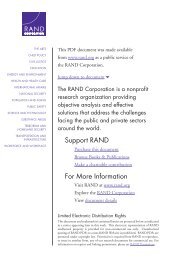RUSSIAMisawa Air BaseMONGOLIAOsan Air BaseNavalAirFacilityAtsugiKunsanAir BaseYokota Air BaseFleet Activities YokosukaMarine Corps Air Station IwakuniFleet Activities SaseboCHINAKadena Air BasePACIFIC OCEANMYANMARTHAILANDVIETNAMPHILIPPINESAndersen Air Force BaseNaval Base Guamas an actual nuclear attack and would consider retaliation in kind to be ajustifiable act of self-defense. In case deterrence fails, however, the UnitedStates should ensure that all its military systems are hardened againstelectromagnetic pulse.Bolster the Capabilities of Allies to Defend Themselves AgainstAttacks by Missiles, Aircraft, or Special OperativesThe United States should help the military and security forces of regionalfriends and allies ensure that they are prepared to defend their airspaceagainst Chinese missiles and aircraft, to counter covert attacks originatingfrom their own territories, and to clear their ports or harbors of mines.U.S. policymakers should openly publicize these steps to reduce thelikelihood that China might undertake actions that would result in aconfrontation with the United States.Map of the “Dragon’s Lair” showingsome portions of the western Pacificthat are most vulnerable to Chineseantiaccess measures. Antiaccessmeasures could severely degrade theability of U.S. forces to operate fromairfields in Okinawa, South Korea,and the main islands of Japan; impedethe deployment of forces to forwardoperating locations; degrade commandand control, early warning, or supplycapabilities; and prevent naval surfaceassets from operating in watersnear China.New or Improved Capabilities Would SignificantlyReduce the Antiaccess ThreatIn addition to mitigating the potential effects of a Chinese antiaccessstrategy using existing means, the United States can further protect itselfby acquiring or improving several important capabilities: Advanced ballistic missile defenses would reduce the ballistic missilethreat to air bases; to C4ISR and logistics facilities; and, if Chinaacquires the capability, to ships at sea. An advanced capability to detect, identify, and attack mobile timesensitivetargets would reduce the ballistic missile threat to air bases;to C4ISR and logistics facilities; and, eventually, to ships at sea. Advanced land-based and advanced shipborne cruise-missile defenseswould reduce the cruise-missile threat to air bases, to C4ISR andlogistics facilities, and to ships at sea.<strong>Annual</strong> <strong>Report</strong> <strong>2007</strong> 27
Roger CliffHowdoyoutakeaproblemthatmayormaynotmaterializetenyearsfromnow and turn it into something you can begin to deal with today?Roger Cliff has been asking—and helping to answer—that question withrespecttoChinaforthepastdecade.Cliffisaseniorpoliticalscientistat<strong>RAND</strong>whosecareerhascoincidedwiththedevelopmentofacenterofexcellencefor strategic studies on China in PAF. He led the team that investigated China’santiaccess strategy.“AftertheColdWar,defenseanalystsbegantosuspectthatChinawastheonlycountryinAsia,andpossiblyintheworld,thatcouldposeasignificantmilitarythreattotheUnitedStates,”herecalls.“Butthethreatseemedremote.China was still very far behind the United States economically and militarily.”To help it make force-planning decisions that would need to be made yearsin advance of any threat materializing, the Air Force decided to invest in along-term series of studies on China in PAF. The purpose was to monitor China’sgrowth, discern developments in its military strategy and capabilities, assessthepotentialimplicationsforU.S.securityandinterests,andrecommendappropriate force postures to counter or mitigatethreats.Inthisway,theChinaresearchwouldresembletheSovietstudiesthat<strong>RAND</strong>performedinthe 1950s.Cliffjoined<strong>RAND</strong>in 1997,astheChinaresearchwasgettingunderwayinearnest.HehadjustcompletedhisdoctorateininternationalrelationsatPrinceton,wherehefocusedonChina’srelationshipwithTaiwan.Sincethen,hehasworkedwithother<strong>RAND</strong>analysts,suchasDavidOrletsky,EvanMedeiros,KeithCrane,andDavidShlapak,onprojectsstudyingtheimplicationsofChinese arms sales, the military potential of China’s commercial technology,China’s military modernization efforts, and the future of U.S.-China relationsafter the resolution of Taiwan’s status.ForCliff,thekeytothisresearchlayinmakingtheconnectionbetweenChina’s political and strategic thinking and the military operational implicationsthat form the basis of force planning decisions. “It’s easy for regionalists like meto make predictions,” he says, “but the recommendation that most often comesoutofthatapproachistocontinuetopaycloseattentiontotheregion.Ourresearchhastogobeyondthat.”Cliffgainedaheightenedappreciationforthisconclusion during the two years he spent on loan from <strong>RAND</strong> to the Office ofthe Secretary of Defense, where he worked with military and civilian plannerson projects beyond Asia involving the U.S. intelligence community and the 2001Quadrennial Defense Review. “After that experience, I had a much better senseof what planners need from us and the way that operations analysis fits intoour regional work on China,” he says. “It requires another level of translation,first from Chinese to English, and then from Chinese political and doctrinalwritingstorealmilitarychallengesthattheU.S.armedforceshavetobepreparedfor.” As a project leader, Cliff puts this into practice by bringing together<strong>RAND</strong>expertsfrombothregionalandoperationaldisciplines.TheapproachCliffandhiscolleagues(whoincludedMarkBurles,MichaelChase,DerekEaton,andKevinPollpeteratthetimeoftheantiaccessstudy)aretakingappearstobepayingoff.TheAirForceandotherserviceshavebeen adopting measures to mitigate the potential effects of China’s antiaccessstrategy, such as deploying Patriot antiballistic missile systems in Okinawa andforging a new agreement with Japan for contingency access to some of itsairfields in case of a military conflict in the region.Cliffexpectsthathisteam’sapproachwillcontinuetoyieldactionablerecommendationsfortheAirForceandDoD,especiallywithrespecttoChina’spotentialfutureair,missile,andspacepower.“TheAirForcedeservescreditfor continuing to stay focused on this issue despite more immediate challenges,suchasIraq,”hesays.“Chinesestrategyisevolvingasthesituationaroundtheworldisevolving.OurjobistohelptheU.S.militarymakesureit’sprepared to stay ahead of the curve.”28 <strong>RAND</strong> <strong>Project</strong> <strong>AIR</strong> <strong>FORCE</strong>


